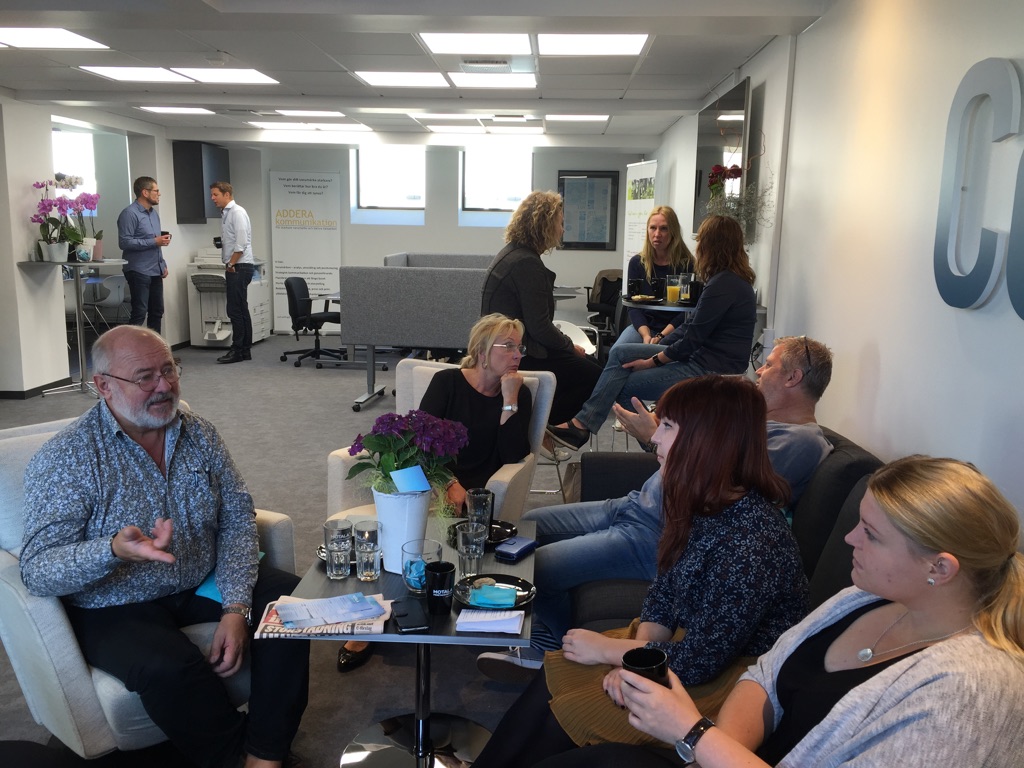
“Let us re-think role models!”
Swedish SME executives agree: New (gender neutral) approaches for recruiting improve spirit and creative potential in the company
How do we manage to change with SWOPS preconceived opinions and beliefs of young people in their personal career choices positively? To this end came on September 1, 2015 Motala, the capital of the Swedish province of Östergötland, a select group of decision-makers and decision-makers of three medium-sized companies from the region together.
(computer-aided translation)
This involved as a practice partner from industry, commerce and care as part of the EU-funded restructuring project SWOPS, initiated by BPW Club Berlin eV Young people now know comparatively little about what to expect with the entry into the world of work specifically on them. Stereotypes and clichés play a major role in choosing a career. A job in the industry – noisy, dirty, boring. Pflegeberufe – underpaid employees under inhumane working conditions. Working in retail – every day sitting at checkout.
As almost everywhere in Europe are also Swedish companies face the challenge of job beginners and -einsteigern to keep in mind just how versatile and challenging an activity in one of these industries may be. In industry there is in Sweden as well as in the care sector most difficulty attracting young people to appropriate training courses and continuing education opportunities. The Swedish government has furthermore found a general lack of well-qualified workers – central obstacle to the national economic growth in Sweden.
As a future topic number one, the central key for more skilled workers and more creative potential in the company, look at the leaders of the four participating SWOPS SMEs in the redesign of recruiting processes. This is the result of an analysis of previously conducted individual interviews with the executives of the companies that s based on an organization of experienced developers / pause / specially prepared interview guide were made. “If we write out ten jobs, we get ten male applicants.
Unfortunately, women are interested only rarely for jobs in our industry, “complains Wiggo Ericsson, Managing Director of the Swedish company Holms industry. “With us, shows the exact opposite,” said the recruiter Eva Lindquist Aleris, a company in the health and healthcare sector, “we rarely get applications from men. Our industry is clearly dominated by women.”
Anders Lindblom, CEO of Östensson, a grocer from the region Motala:” We have tried to create in the course of our offer seasonal jobs, especially for young men job incentives. At 90%, there are girls who apply for our vacancies. That is why we have introduced a quota for male young professionals. We will do that a second time, because we want to prevent highly motivated girls are displaced by less motivated male candidates who then might make a less good job at the end. ”
SWOPS has caused in the region Motala that the participating managers to have teamed up an informal clusters of SMEs, which makes it his mission to inspire young people for new careers. At the same time they are committed to raise awareness among young people, when it comes to reconsider stereotypical role models to expand in this way the range of their options when choosing a training center.
The four SMEs participating in SWOPS are simultaneously a member of the business clusters for location strengthening the SME sector, Tillväxt Motala, where about 130 small and medium enterprises are members who also benefit in this way from the experience and knowledge gained from SWOPS. “Thanks to SWOPS are now common plans for new networking opportunities between schools, educational institutions and training institutes emerged,” says project manager Agneta Larsson says. Is at least as important to engage and involve the media in order to make positive examples of modern innovative workplace design in the public known.
“We want to resolve the stereotypes in the minds of young people as well as their teachers, parents and role models in their environment”. All participating SMEs meet the Swedish standards on gender equality, which includes the organization of periodic salary surveys and salary adjustments to avoid possible unequal pay. At the same time the companies are subject to an equality plan, which must withstand a periodic review. Apart from in Sweden generously handled parental leave, which also includes “Fathers months”, there is a functioning in-house childcare facilities within the company and with a wide range of female professionals and managers who wish to climb the career ladder – unlike in education and further where the gender neutral offer in terms of career choice and professional development is still manageable and the action correspondingly large.
Agneta Larsson: “All leaders who join SWOPS, are optimistic and looking forward to it, effectively promote structural change in our region with the new tool. Let us overcome stereotypes by giving young people handy background information at hand. What actually happens behind the corporate facade? Because something exciting going on! It brings fun and lots of challenges in industry, working in the care sector or in retail. Let role models rethink. “The BPW Club Berlin eV has the application filed with the European Commission to promote SWOPS in Summer 2013 with the aim to explore the reasons why in terms of opportunity fairness in business a still glaring contrast between claim and Reality exists.
This was preceded by the assumption that structural factors and the roles of decision-makers and decision-makers play an important role: Whether manager or human resources manager – as long as they (unconsciously) be guided by traditional role models, have male executives in the company a good chance of favoritism – be it in hiring, for promotions, salary increases, bonuses or training opportunities. At the same time there are also at working women different characteristics traditional thinking and acting.
SWOPS aims at designing a HR tools, which go in particular the causes of inequality in the world of work on the ground and will develop criteria for the measurability of impact.